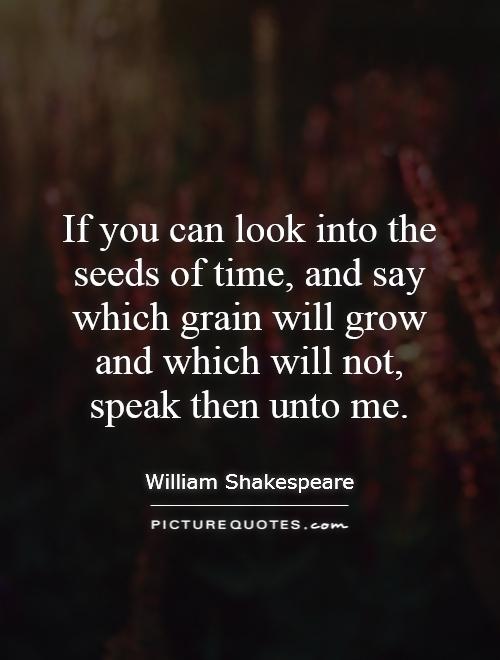If you can look into the seeds of time, and say which grain will grow and which will not, speak then unto me

If you can look into the seeds of time, and say which grain will grow and which will not, speak then unto me
In William Shakespeare's play Macbeth, the character Banquo speaks these words to the three witches who have just delivered prophecies to Macbeth. Banquo is skeptical of the witches' powers and challenges them to prove their ability to see into the future by predicting which seeds will grow and which will not. This quote highlights the theme of fate versus free will that runs throughout the play.The witches' prophecies set in motion a series of events that ultimately lead to Macbeth's downfall. Macbeth becomes consumed by ambition and greed, leading him to commit heinous acts in order to secure his position as king. However, the prophecies also foretell Macbeth's eventual downfall, as they predict that he will be overthrown by someone not born of a woman. This prophecy ultimately comes true when Macduff, who was born via Caesarean section, kills Macbeth in the final act of the play.
Banquo's skepticism towards the witches' prophecies serves as a contrast to Macbeth's blind faith in them. While Macbeth allows the prophecies to dictate his actions and ultimately lead to his demise, Banquo remains cautious and skeptical. This highlights the theme of free will, as Banquo's skepticism suggests that individuals have the power to shape their own destinies through their choices and actions.
The quote also raises questions about the nature of fate and whether or not it can be altered. The witches' prophecies suggest a predetermined path for Macbeth, but Banquo's challenge to them implies that the future is not set in stone. This ambiguity adds depth to the play and invites the audience to consider the role of fate in shaping our lives.
Overall, Banquo's challenge to the witches in Macbeth serves as a powerful reminder of the complexities of fate and free will. The quote encapsulates the central themes of the play and invites the audience to reflect on the nature of destiny and the power of choice.












 Friendship Quotes
Friendship Quotes Love Quotes
Love Quotes Life Quotes
Life Quotes Funny Quotes
Funny Quotes Motivational Quotes
Motivational Quotes Inspirational Quotes
Inspirational Quotes